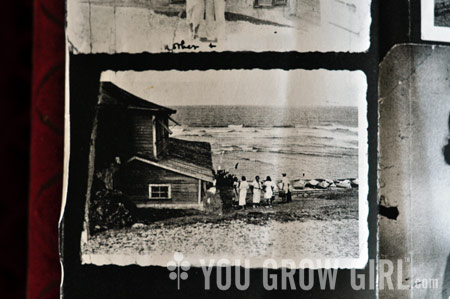
This is a long one. I suggest you make a cup of tea and a snack before starting.
-
“And now listen carefully. You in others-this is your soul. This is what you are. This is what your consciousness has breathed and lived on and enjoyed throughout your life-your soul, your immortality, your life in others. And what now? You have always been in others and you will remain in others. And what does it matter to you if later on that is called your memory? This will be you-the you that enters the future and becomes a part of it.”
– Boris Pasternak (Doctor Zhivago)
Back in December 2009 my partner Davin and I took a month long trip to the Caribbean. We spent 4 days in Barbados, 3 weeks in Dominica, and one week in St. Lucia. Since that time I have posted on and off here with photos and short stories depicting my botanical experiences through that month. There are still so many gardening and plant related stories left to tell. Every single day was loaded with new plants, flowers, food, sights, and sounds. We went on hikes into the rain forest, up mountains, and to a Boiling Lake. We got to see a place that felt like witnessing the birth of the world. We stayed on an organic food farm and picked ginger flowers that would be made into centerpieces for rich people. We visited an organic farm that specializes in traditional herbal medicine. We went inside an ocean-side cave. We touched walls covered in more ferns than I have ever seen in my life. We walked among grasses and cacti. We saw plants I will probably never be able to identify. We spoke with humble gardeners, visited massive backyard farms, and met an incredible 99 year old woman. We found new friends to whom I feel a great deal of gratitude. It was pretty much awesome.
As you can see I have barely scratched the surface here and hope to get a chance to tell you some of these stories over time.
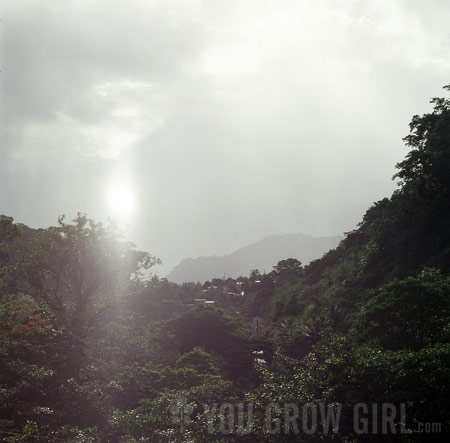
One story I am yet to tell is why I went in the first place and how that part of the trip played out. The trouble is I’m still not quite sure what I experienced during that month and how to tell it here, or anywhere. And so, I have spent the last few months since we’ve returned avoiding it.
-
“She talks sadly about this need in people to make other people deny parts of themselves. She tells me that a person cannot feel right in their heart if they have denied parts of their ancestral past, that this not feeling right in the heart is the cause of much pain.” – bell hooks (Bone Black)
A few months before we left, I wrote about my West Indian roots, my maternal grandmother, and why as a gardener I had a need to go to the Caribbean and see how people relate to gardening. Of course there were other reasons, too. I have spent my whole life grappling with who I am, and what I can only describe as a very complex and multifaceted identity. I am a female human being with a very mixed race/ethnic background, a difficult, complicated past, and a deep need to make sense of it all. There is an awful lot to sort through, and I have been, but still there remained this big, missing piece of the puzzle. Without that piece I didn’t feel there was a real chance for me to ever feel right in my heart.

As time passed it became clear to me that I needed to see and experience the West Indies for myself, through my own eyes. I felt I had already waited too long and it had to happen immediately if I was going to move forward and grow. I needed to seek out details and answer questions about the people who came before me. My people. Some whom I have known without really knowing them at all and others whose names remained a mystery. Who were they? Where did they come from? How did they live? How did all of these different people from vastly different worlds come together and eventually make me? How did their lives impact mine?
Most of all, I needed to touch, see, smell and take in the physical landscape that they came from. That I come from.
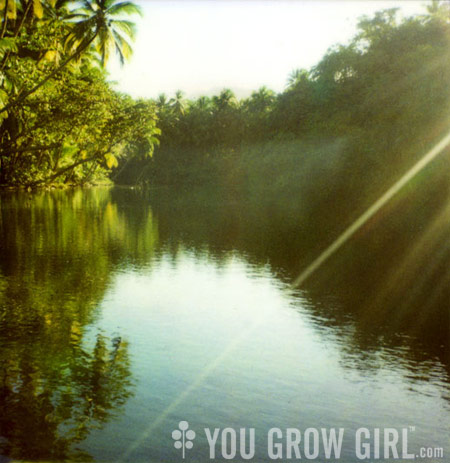
[And yes, it does feel awkward, uncomfortable, and vaguely cheeseball using that language but it’s true so there it is.]
Which brings me back to gardening. I needed to see and experience that landscape in order to even capture a glimpse of how my ancestors related to it. What does their connection to that land say about me?
And inside all of those bigger questions, another: Why do I garden? I suppose the question is even bigger than that. Not so much Why do I garden, but Why do I need to garden? The impulse to do this is so intrinsic to who I am. It has evolved into a requirement for living, as basic as cooking dinner or brushing my teeth. Wash hair, put on clothes, nurture plants, eat lunch.
Is this connection the result of nurture (I need to garden to heal the damaged parts of myself) or nature (I need to garden because it is in my blood)?
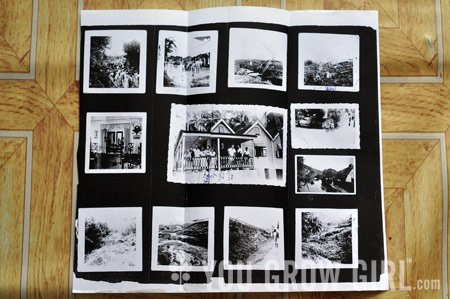
-
“But people are always speculating — why am I as I am? To understand that of any person, his whole life, from birth, must be reviewed. All of our experiences fuse into our personality. Everything that ever happened to us is an ingredient.” – The Autobiography of Malcolm X
For the whole of my adult life and probably before, I have believed that nurture trumps nature in influencing who we are and who we become. I do not believe in fate, destiny, or doom. I do not believe that we are powerless to assert agency in our lives, although I do believe that circumstance makes it much, much harder for some people. I do not believe that people are born evil. I don’t even believe in evil. I believe we are all deeply affected by our experiences and that every waking moment is an opportunity to take one small step towards being transformed. I am not yet convinced that truly irreparable damage is possible.
I believe this, because if I believed otherwise I would have had to succumb to and share in my parents’ bleak worldview: People like us are doomed. Life is miserable. Don’t rise above your station or bother to try. Don’t be prideful. Who do you think you are? You are nothing; don’t forget it. There is only so much good stuff and opportunity available in the world and we are not recipients but rather powerless victims of circumstance.
I don’t believe them, although I understand why they did/do. If I did, I wouldn’t be writing this right now.
This trip and all of the big ideas around it have forced me to confront the concept of nature and how that plays into who I am as a person and a gardener. It has made me ask the question, Can a place I have never seen be in my blood? And, Can the need to grow plants be mapped out in my DNA as a trait passed genetically? Or is that just crazy talk?
While in Dominica I did some digging around to try and glean facts and inklings of my ancestral past. I began with the question of where my surname comes from and kind of went from there. I returned home from the trip feeling like I had learned a lot but also extremely disappointed in the new questions I was unable to answer.
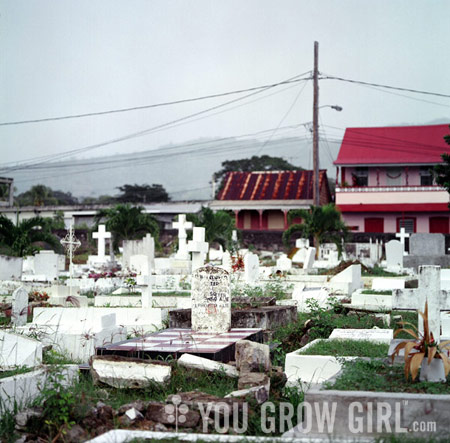
What I learned was:
- The Trails were white planters from Scotland. I could never find definitive proof of this but based on the time frame it means they were probably slave owners. This is not a shock since I have long suspected this, yet it is still somehow hard to digest. Who in the Caribbean isn’t descended from slaves or slave owners or both in some distant or not-so distant way? I am descended from both and am having a surprisingly difficult time coming to terms with it, even though I have always known it.
- The name of my great grandfather but nothing about him. I can’t be certain, but chances are he wasn’t white (despite his name) and was probably an “out” child (as-in out of wedlock). I come from a long line of “out” children and am one myself so this is no surprise. What did come as a surprise is how much shame still exists in a truth that is so widely prevalent. I myself feel no shame in this. Who cares? Let’s get over it.
- Where my grandmother was born and roughly where she lived.
- I was never able to confirm my lineage on my great-grandmother’s side but I did meet distant “cousins”, whose family have also been farmers and who are also mixed race. Meeting them and visiting the farm and farmhouse that is 300 years old was pretty cool. It was also extremely surreal.
- The man who may or may not be my great-great grandfather (or great-great-great grandfather) was a writer who wrote pamphlets and books about… wait for it… farming, gardening, nature, and travel. I think he worked with the Botanical Garden. I am still trying to locate a piece of his writing and am incredibly curious to see what he had to say on these topics.

I have to admit that it has been very uncomfortable bringing nature into the mix when resisting it as a force or important component in forming my identity has been about self-protection and offering myself a chance to thrive. But I’m older now and I am able to revisit and revise my beliefs based on experience and knowledge. Otherwise everything I believed would just be dogma and I’d be a slightly different version of my parents.
New experiences and knowledge has me willing to entertain the idea that nature could play a role of some sort in both who I am AND my relationship to gardening.
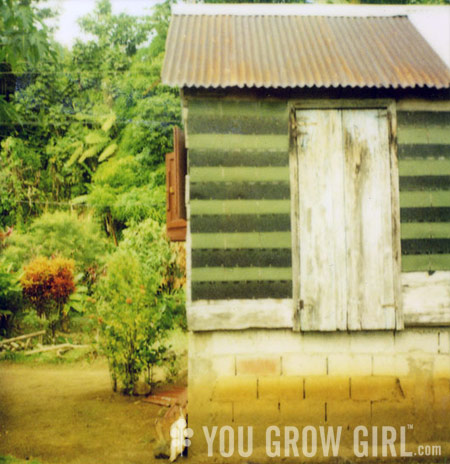
Nurture has played a huge part in how the impulse to garden is manifested in my day-to-day life. Over the years I have identified many ways in which my life experiences have shaped how I garden. But perhaps, just maybe, genetics could hold the key to why I was and am so strongly compelled to grow plants in the first place. After all, there are lots of outlets for personal growth, creative expression, and healing. I engage in all sorts of activities that serve that purpose in my life, but gardening and the need to connect to nature in that way was there from the start, even when there wasn’t much nature in my physical geography to connect to.
I wrote before that it all started for me when I was five years old with a parsley seedling germinated in a Styrofoam cup. That little plant sparked something that lay dormant inside me and it took me until I was an adult and several starts and stops to reach out and grab it. I am still reaching out and grabbing it in new ways everyday and that thing inside me is newly inspired and reignited every time I look at a plant. That’s got to be more than nurture. You think?
Wow. What a great story! It makes me want to dig up my past and see what kind of connections there are. You’ll have us all traveling the world to find out why we’re gardening, Gayla.
I’m wondering if this is like the reason or passion question … if so, I think it’s both and you have a nurturing nature :)
Amazing story, Gayla. Thank you so much for sharing.
Dear Gayla – Love your day-to-day comments and photos but have not felt compelled to comment until now.
As an adopted child I relate deeply to all that you have shared in this post; and as a biologist I have always puzzled over the truly paradoxical relationship between nature and nurture. I’m not any further down that road than you are, but I do think you’ve possibly written the beginning to your next book.
We’re not that different from plants- in the same way you nurture your plants, your past- the whole universe at your back- has nurtured you. Nature nurtures nature, ad infinitum!
Great story! I am so glad you made the trip. I am sure it will be a life-altering experience for you.
Thank you for sharing. I also feel we hold responsibility to create our lives and that the help and love around us have extraordinary effect of us throughout our lives.
I also come from a long line of farmers and gardeners. Now that I have a real garden I find I can express so much of myself in it.
Best wishes to you on your quest to discover your past and find answers. It can be a hard road but the hard roads are the ones we learn the most from.
Happy growing!
Lovely story, Gayla. Thank you for sharing it with us.
My paternal grandparents played a large part in in raising me. They came to the states from Germany during WWII and it was always such a touchy subject. My grandfather joined (rather, was forced to join) the US Army to guarantee his citizenship, but it meant fighting against his homeland.
When they eventually had children (my father and his siblings), they were taught to be as “American” as possible and their German/Austrian roots were never discussed. By the time my generation rolled around, my grandparents must have realized what a loss this was and maybe were thinking about their own mortality because they launched a full-scale Germanic History program on their grandchildren. I traveled to Europe regularly with my grandfather, we were taught the language and most of us spent a school year with relatives in Germany.
I was very lucky to forge a small connection with a piece of my heritage before they both passed away. It seems you did the same or maybe you’re on the right path and I wish you all the luck in the world to find what you’re looking for.
I’ve been on a quest to find my family history recently too, although mine began much more benignly than yours. My last name is Kilner and I went online to find Kilner jars, got curious to see if we were related. We’re not, but 4 months later I am completely addicted to genealogy and have traced both sides of my family back multiple generations. Most of my history is fairly uneventful although there have been a few surprises ( one of my gggrandmothers may not be who we thought, and a surprising number of the women I come from married younger men.) Some of my family have proved very elusive to trace and I’ve become obsessed with poring over old parish records and agricultural surveys for clues. I’ve also made some wonderful connections with other researchers , had regular lunches with an aunt I barely used to see and may be going to England soon to search in person!
Gayla if you find you do want to know more and would like help with this, please feel free to email me and I’ll see what I can find. I don’t promise to be an expert but I’d be happy to give it a shot.
Such a powerful piece of writing here. Thank you for sharing. This year I am growing my first major garden of veggies and it thrills me to pieces.
I’m sorry your journey has been so difficult, but I commend you for your efforts. It’s important. I think it’s extremely gracious of you to share your thoughts and passions in a public forum. Others will learn from you, and by inspired by you. Keep up the excellent work.
mmmm…thank you for sharing.
Beautiful entry. And it seems you have one of many answers to the T-shirt question in there – What would nature do? Nurture that which wants to grow. Best of luck to you in your digging and growing.
Thank you.
Gayla, this is a truly touching and fascinating entry… one that I’ve been looking forward to since you announced the trip. I’m happy that you found some of the information you sought — no matter how challenging — and that you still have questions to pursue. Your self-seeking is inspiring to me. I’m also somewhat of an “out” child, with various family fragments, some known to me, some not as much. I admire the lengths you’re going to make sense of what/who made you.
Gayla,
Have you ever read the book The Orchid House by Phyllis Shand Allfrey? http://bit.ly/bYlmV2. Allfrey was from Dominica and the book is set there. I read it a long time ago, but I believe it’s about a family of planters. Allfrey was apparently quite a woman, she even founded a political party http://bit.ly/c7IIUg. And if memory serves, she was a childhood friend of Jean Rhys (also from Dominica).
Sara: I haven’t yet, but I’ve had it on my list since the trip. While in Dominica, I managed to pick up another book by her called “It Falls Into Place“… and met the woman who published it too.
Thanks for sharing this story, Gayla. I’m not one to believe in destiny either, but sometimes it’s hard to deny the parallels that show up from generation to generation. Be well!
Gayla, Thank you for this remarkable post.
The New York Botanical Garden has an enormous amount of material originating from the Caribbean in its research library; you might want to contact them to see if they’ve got the pieces written by your great-great grandfather. The library’s website is accessed under the Learning tab at http://www.nybg.org.
Best of success with your continued search.
I love that you’re brave enough to post these personal stories. Did you come back from the Caribbean feeling renewed and vibrant? Were you radiant? I feel that way every time I come back from Puerto Rico. Maybe it truly is something inside- like we returned from a “native habitat”.
I wish you luck on your search. I know my paternal grandparents are Puerto Rican but my Mom is a mystery. She was adopted in Mexico and there are no records of her birth. Her foster mother (also Mexican) maintained a garden in a Hispanic barrio in California. It made my mom a gardener and now I’m one too.
Sometimes culture, not blood, shape us. It’s all overwhelmingly complex and mysterious.
I believe that like plants, the seeds our parents sow when they create us lay the path for a strong, ingrained personality. But I also believe that we sow seeds each moment, of hope, anger, despair, love. And those sown parts of us that we don’t want, such as selfishness or hate, must be left uncared for if they are to wither away.
Sometimes when I hold a fistful of dirt, I think about how each particle has lived a thousand billion lives, as a previous plant, a part of bone, a particle of air inhaled by a dinosaur. After life, the ashes of slave owners, slaves, the persecuted and the persecutors mingle together in new ways to continue life.
Cliche as it sounds, it takes traveling around the world to accept that some answers are only found within.
I can understand why you may not want to entertain the notion that your natural history defines you, based on what you’ve said about your parent’s worldview and the culture of shame that is integral to that. My family history is different from yours, but feelings like shame and guilt come so “naturally” to me it’s hard to know where they end and I begin. I’ve also experienced an almost overpowering urge to garden and to nurture green things, and do so to heal myself and to satisfy something instinctual inside me.
At first I was embarrassed my how moved I was by watching my plants grow, and by all the personal metaphors that came from growing and nurturing my garden – we’ve heard the cliches a million times – but the moment I opened myself up to what my garden had to teach me it opened a door to a kind of refreshing emotional sincerity that has changed me. Not completely, but it has changed me for the better and it continues to. It grounds me. It connects me. It feeds me.
Keep searching Gayla, there’s good stuff to be found!
~d.
I have a lot of the same questions about my Jamaican family, for a lot of the same reasons you do. My maiden name is a Scottish name, most likely passed on to my family from their (slave) owner.
It’s been an interesting trip through archives for me, and I hope to have some more time soon, to do some more research and try to find birth certificates, etc.
Thanks for writing about your feelings on the subject. It’s nice to know I’m not the only one. :)
Beautiful post – thank you for sharing these difficult questions & not fully defined answers.
I believe genetics has a lot to do with who we are & what we do in life. I have a history of Dutch bakers in my family & unfortunately I can’t bake to save my soul…
…but I do garden & am healed by nurturing green things, so there has to be something in my genetic heritage that allows me to do this!
Can’t wait to see more photos!!
ps – finally got my hands on your new book & am hoping for a few days of rain so I can read it!
This was the most beautiful posting. Thank you so much for writing it.
What a beautiful post. I’d love to hear more of your trip and your thoughts, maybe a book? You have talent not only in gardening but writing as well.
I agree that the bones of this post would make a lovely book. There’s no denying the power of the Ancestors, mine were Czech tailors and I’m happiest with some sort of (crafty) needle in hand. Is that Nature, or Spirit? I think the spirit of the ancestors know the secret path of DNA, and inform our actions, for sure. Thank you for sharing your deep thoughts!
I loved it. And I didn’t even have any tea!
It is so wonderful that you were able to travel back to your roots. I’m sure you have also used sites like http://www.ancestry.com and http://www.familysearch.org? Those are some of the best I know.
Happy journeying.
I call my little plants ‘my babies.’ I check on them almost every day. They make me happy.
I cried when I read your post.
Your name is Trail and that’s what you must follow-a path. My name is Ozag, in Polish meaning acorn. I must grow.
Hope you come to Chicago. Borders on Michigan Ave. would be very interested in having you give a book reading.
Linda: I like the way you’ve put it. Although I think I might make a slight change and shift “path” to “journey.”
I have lots of requests to come back to Chicago just no way to get there.
Suzy: Part of all of this for me (there are many parts) is in finding “a spirit of my ancestors” that has some positivity and joyfulness to it. Everything I have known prior to this has been depressing and focused on basic survival — nothing about thriving. I figure there must have been some thriving and joy in there too. I truly hope.
Helen: Thanks so much.
Karen: Thanks for that lead. I will look into it!
Karen: dang. I looked and nothing.
Hi, Gayla! Thanks for this remarkable piece of writing.
Your nature versus nurture quandary is much like the academic discussion of the essentialist versus constructionist view of human nature. Is their anything essential or innate in people,i.e. some essence they share across all time and cultures, or is everything just some sort of specific cultural artifact, imposed on them from without? Over time, explanations of human behavior have swung from religious (the devil made me do it), to psychological (she had such a deprived upbringing it’s no wonder she turned out to be so bad) to biological (his brain chemistry is completely out of whack causing him to run amok).
I think the idea that nurture trumps nature is appealing, because it allows for the idea that we humans have some control over who we are and what we become. But I think biology is proving to play a bigger role than we once assumed, though exactly how remains a bit mysterious. I mean, there probably isn’t a gardening gene, so by what biological mechanism is this gift and passion passed on from an ancestor to another generation? And I think it is becoming increasingly clear that this sort of thing can be, in fact, inherited.
You might find this little story interesting: I work at a major research university and this week the home page of our website featured a story about a very talented young man who was about to graduate with a masters in Engineering. He had entered college at age 13, and is about to get his Masters at the tender age of 19. The child of a single mother who conceived him by artificial insemination, he was curious about his biological father. So they tracked him down only to discover that he, too, was an engineer, in the exact same field as his son. Had he raised this boy, we might think that nurture had let the kid to his chosen field of study but, of course, this was not the case. The boy also discovered an a.i. half-sibling, who was also an engineer, albeit in a different field of engineering. Kind of spooky, yes?